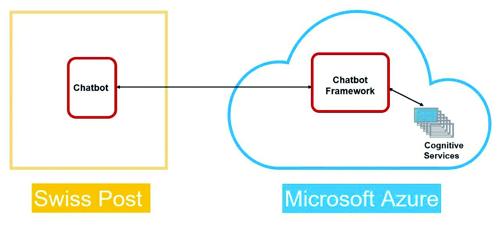Concept for the use of Cognitive Services at internal Customer Support of Swiss Post Ltd.
- Degree programme: EMBA Innovation Management
- Authors: Daniel Bammert Marty, Julie Mackmood
- Year: 2019
Swiss Post uses innovation to create new business areas and drive digitization forward. Internal processes are being optimized and automated in all areas. Information Technology Post is the in-house service provider for information and communication services. The interaction of users with the Service Desk could be optimized by using a chatbot with cognitive services.
Today the internal customer care service is very dialog intensive. Service Desks agents interact daily with customers via telephone, e-mail and ticketing system. The degree of automated interactions between the Service Desk and customers is low. Employees often have to deal with repetitive questions and must execute tasks that the users could do themselves. Due to such queries, the current costs of the Service Desk are too high and the problem-solving time takes too long. One possible resolution would be automation using a chatbot with cognitive services.
In order to optimize the whole internal customer care service, it may be realistic to replace some of the agents with a conversational Chatbot (initially text-based) to answer the repetitive and standard queries. It is however important to note that a chatbot with cognitive services is not to be likened to a virtual assistant. It is still an automated system and not a human.
Chatbots have now reached a maturity level to be used in companies. Information Technology Post wants to check the suitability of chatbots in the Service Desk with a text-based Chatbot. The advantages include 24*7 availability, simultaneous conversations with different people, reduction of operation costs, increased customer satisfaction through polite behaviour and the automation of repetitive work. Overall, users could receive a better experience, costs could be reduced and the work of the help desk employees could be more varied.
The goal of this thesis was to describe what kind of cognitive services exist today, which of them are suitable to implement in the context of the user Service Desk and propose how to implement them.
To understand the big picture, cognitive computing enablers and their relevant application for Swiss Post were described. Methods such as environmental analysis and process landscaping were used to understand the relevant environment. The business case was described to highlight the needs of the customer. Cognitive services were evaluated according to a pre-defined set of criteria and as a result their proposed stepped implementation was depicted on a roadmap.
Based on the analysis a concept for the implementation of the chosen cognitive services was created. Effects on the organization, processes and financial consequences among others were described. Finally, measures for each aspect of the concept were summarized to give a recommendation to the Board of Directors for further development in the field of cognitive services.
